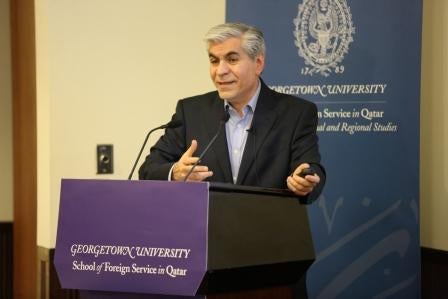American Studies, Dialogue Series, Environmental Studies, Regional Studies
Gas and Alternative Fuels: Present and Future Shares and Challenges

Worldwide gas and energy exploration and production trends were the focus of a Center for International and Regional Studies (CIRS) Monthly Dialogue Series public lecture at Georgetown University in Qatar (GU-Q) on March 24, 2014. The event, titled “Gas and Alternative Fuels: Present and Future Shares and Challenges,” featured H.E. Dr. Seyed Mohammad Hossein Adeli, the Secretary General of the Gas Exporting Countries Forum (GECF), an international governmental organization, which is headquartered in Qatar, dedicated to promoting the global natural gas trade.
“What do we do in Tornado Tower here in Doha?” asked Dr. Adeli, who is also Iran’s former ambassador to Japan, Canada and the United Kingdom, and holds two Ph.D.s in economics and business administration. He answered, “Our mission is to provide an authentic platform for the discussion of gas activity and a center for debate and the exchange of ideas, to promote gas as a clean fuel, increase the market share of gas, and contribute to the stability of the global energy market. But our most important task is to develop dialogue throughout the energy market, to be in contact with other producers, exporters, consumers, academics, and all other stakeholders.”
Dr. Mehran Kamrava, Director of CIRS, emphasized the importance of the Monthly Dialogue topic, saying “We know that natural gas is the cleanest burning fossil fuel, offering environmental and efficiency advantages over other energy resources. Combined with global energy needs that will only increase over time, it’s vital that we understand the market and policy forces that will impact the relationship of supply and demand. The implications for Qatar’s economy and, by extension, its national vision development goals, as well as the global economy, are tremendous, which is why we were so pleased to host an energy specialist of Dr. Adeli’s caliber on our campus for students, faculty, visiting dignitaries, and the Doha community.”
The former diplomat discussed gas market dynamics at length, which includes both liquified natural gas (LNG) and pipeline, as well as an overview on the latest revolution in the energy sector, shale oil. “There are huge technically recoverable shale gas resources globally,” he said, but noted the negative environmental impact and the required further technological and policy advances to unlock this resource potential. Other challenges faced by the energy sector include security of demand, environmental impact of coal and the technological gaps “clean coal” still faces, safety issues associated with nuclear energy, and the hurdles of subsidies and high infrastructure investment requirements to make renewable energy profitable.
Adeli also compared gas to other competing fuels in the global energy mix, noting that only natural gas and renewable energy sources, such as solar, were on the rise, as opposed to decreasing coal and oil use. “Gas consumption is increasing by 108 bcm (billion cubic meters) per year, and needs to come into production, which means we need enough investment, development, and trading to meet demands. Reserves are not enough. This is why it’s important to think about incremental increase per year.” Commenting on the supply side of the gas economy, he said, “Of course, we have an abundance of supply. Most of the supply is resources and reserves that are undeveloped. But existing projects are under development, and we are hopeful they will enter the streamline of production.”
The real issue, he points out, is the importance of country policies that ensure optimum gas production to meet both internal, and export, demands. “The dynamics of the economics of the gas domestic market everywhere is going to affect the external trade of gas. Most gas is traded domestically, 70%, and only 30% is traded internationally. When you talk about the Middle East as an exporter, you have to start at the domestic market first, assess the subsidies and efficiencies, to understand how much international exports will take place.”
The GECF member countries together hold 67% of the world’s gas reserves, and include Algeria, Bolivia, Egypt, Equatorial Guinea, Iran, Libya, Nigeria, Oman, Qatar, Russia, Trinidad and Tobago, the United Arab Emirates, and Venezuela. Kazakhstan, Iraq, the Netherlands, and Norway have the status of Observer Members. Fossil fuels, he concluded, “have the lion’s share in the energy mix. In the power generation sector, efficiency of natural gas is the highest compared to other fuels at around 58%.” As the demand for energy rises, gas will continue to serve as a favorable source of energy, which is good news for Qatar, and for all of the members of the GECF.
Seyed Mohammad Hossein Adeli is the Secretary General of the Gas Exporting Countries Forum (GECF). A career diplomat, Dr. Adeli has served as Iran’s ambassador to Japan, Canada, and the United Kingdom. His previous positions also include Governor of the Central Bank of Iran, Deputy Foreign Minister for Economic and Energy Affairs, and Advisor to President of the Islamic Republic of Iran. Upon retiring from the diplomatic corps, he founded the Ravand Institute for Economic and International Studies, which is today one of Iran’s premier research and consulting firms. Dr. Adeli holds two PhD degrees, one in business administration and the other in economics.